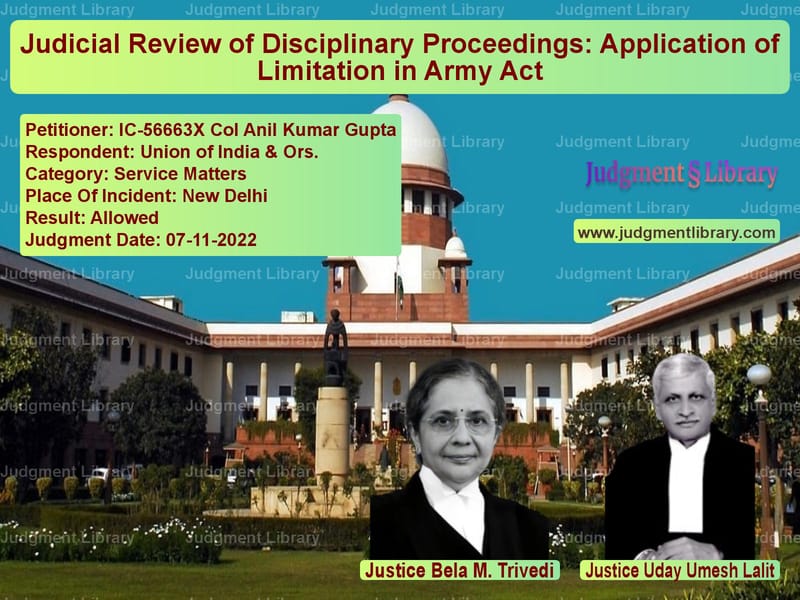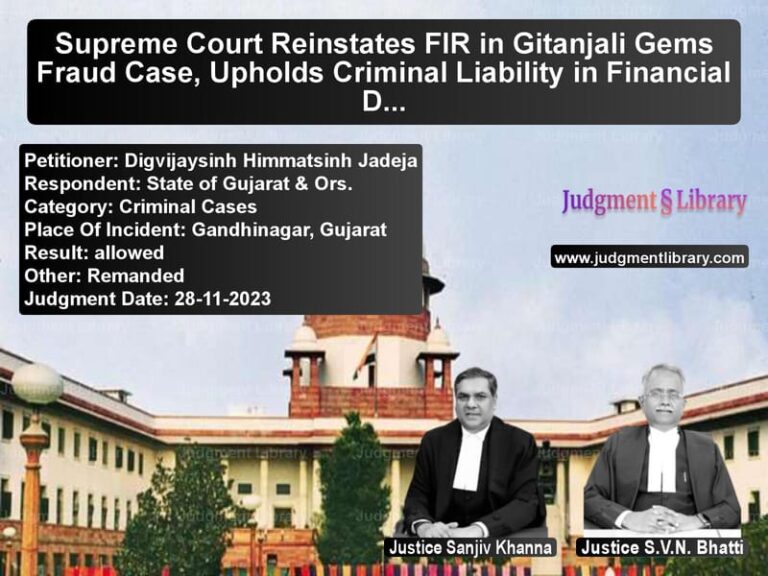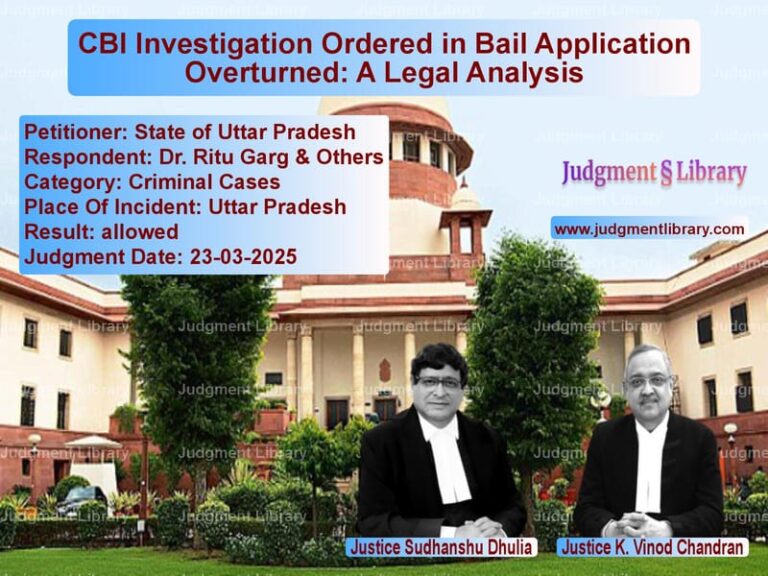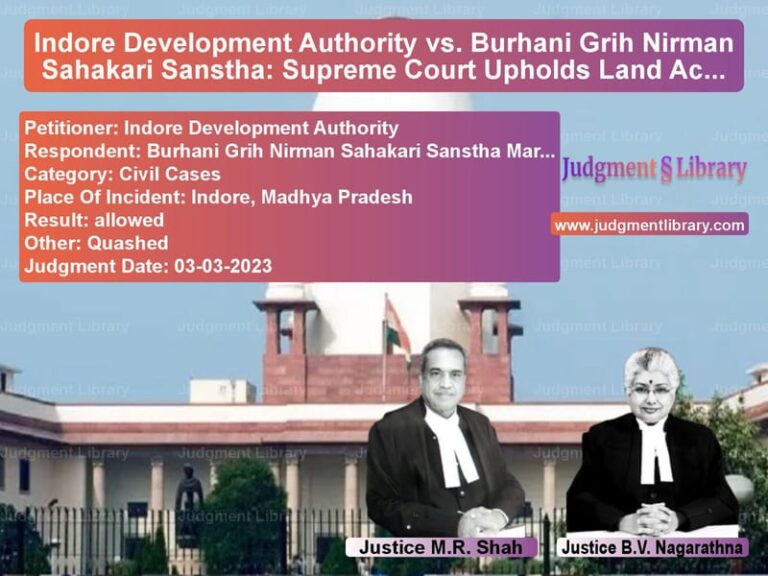Judicial Review of Disciplinary Proceedings: Application of Limitation in Army Act
This case revolves around the appeal filed by Colonel Anil Kumar Gupta against the order passed by the Armed Forces Tribunal, which dismissed his application challenging the charge-sheet and order directing his trial by General Court Martial (GCM). The appellant was accused of behaving in a manner unbecoming of his position and character, under Section 45 of the Army Act, 1950. The primary issue raised was whether the disciplinary proceedings were barred by limitation, as per Section 122 of the Army Act, 1950, considering the time elapsed between the alleged offense and the initiation of the trial.
Background of the Case
The appellant, Colonel Anil Kumar Gupta, was commissioned as an officer in the Indian Army in 1996. In 2015, Colonel Ramneesh Pal Singh, a close colleague, filed a confidential letter accusing the appellant of misconduct, including sending indecent messages to Singh’s wife and engaging in an illicit physical relationship with her. The letter, dated August 13, 2015, led to an internal investigation and a Court of Inquiry that concluded there was a prima facie case against the appellant. Consequently, a charge-sheet was issued in November 2018, and the Convening Authority directed the appellant’s trial by General Court Martial (GCM).
The appellant contended that the trial was barred by the period of limitation prescribed under Section 122 of the Army Act. Section 122 stipulates that no trial by court-martial shall commence after the expiration of three years from the date the offense is known to the aggrieved party or the competent authority. The appellant argued that Colonel Singh had knowledge of the alleged offense in August 2015, and since the trial was initiated more than three years later, the proceedings were time-barred. The Armed Forces Tribunal dismissed the application, and the matter was brought before the Supreme Court for judicial review.
The Legal Arguments
The appellant’s legal counsel argued that the charge-sheet and the trial by General Court Martial were initiated beyond the three-year period set by Section 122 of the Army Act. He contended that the date of Colonel Singh’s knowledge of the alleged offense, as evidenced by the letter dated August 13, 2015, marked the commencement of the limitation period. According to the appellant’s counsel, the trial initiated in November 2018 was clearly barred by the three-year limit.
On the other hand, the respondents, represented by the Union of India, argued that Colonel Singh did not have knowledge of the offense until the Court of Inquiry was completed, which occurred much later than the date of the letter. The respondents contended that the limitation period should be calculated from the completion of the Court of Inquiry and the subsequent finding of a prima facie case against the appellant, which justified the initiation of the trial. The respondents further submitted that the disciplinary proceedings were necessary to address the serious allegations against the appellant, and the delay in initiating the trial was justified by the complexities of the investigation.
The Court’s Consideration
The Court began by examining the provisions of Section 122 of the Army Act, particularly focusing on the limitation period for initiating trial by court-martial. The Court noted that Section 122 sets a clear three-year limit for starting the trial, with the time period beginning either from the date of the offense or from when the offense becomes known to the aggrieved party or the competent authority. The Court highlighted that the limitation period begins from the date the alleged offense comes to the knowledge of the aggrieved party, which in this case was Colonel Singh’s knowledge of the appellant’s misconduct, as outlined in his letter of August 13, 2015.
The Court also referred to the fact that the letter from Colonel Singh was sent in August 2015, making that the pivotal date for the commencement of the limitation period. The Court rejected the respondents’ argument that the limitation period should start from the completion of the Court of Inquiry, emphasizing that the statute clearly defines the start of the limitation period based on the knowledge of the offense, not the completion of the inquiry.
The Court further examined the judicial precedents on the application of limitation in disciplinary proceedings under the Army Act, particularly the judgment in Union of India vs. Delhi High Court Bar Association, which dealt with the period of limitation under similar circumstances. The Court concluded that the provisions of the Army Act must be strictly adhered to, and any disciplinary action initiated beyond the prescribed period of limitation must be quashed.
The Court’s Judgment
The Supreme Court, after careful consideration of the legal arguments and the facts of the case, held that the trial of Colonel Anil Kumar Gupta by the General Court Martial was indeed barred by the limitation period prescribed under Section 122 of the Army Act. The Court emphasized that the limitation period commenced from the date of the letter sent by Colonel Singh in August 2015, which clearly indicated his knowledge of the alleged offense. Since the proceedings were initiated in November 2018, the Court ruled that the trial was time-barred and set aside the order directing the appellant’s trial by General Court Martial.
However, the Court also clarified that the decision did not preclude the continuation of any departmental proceedings that might be initiated against the appellant. The Court acknowledged that the disciplinary proceedings could continue in accordance with the law, provided they complied with the applicable legal provisions, including the limitation period.
Conclusion
This judgment reaffirms the importance of adhering to statutory limitations in disciplinary proceedings under the Army Act. The Court’s decision to quash the General Court Martial proceedings underscores the significance of ensuring that the rights of individuals are protected against the undue delay in the initiation of legal actions. While the judgment provides relief to the appellant, it also reinforces the principle that disciplinary proceedings must be conducted within the framework of the law and in accordance with the timelines prescribed by statute.
Petitioner Name: IC-56663X Col Anil Kumar Gupta.Respondent Name: Union of India & Ors..Judgment By: Justice Bela M. Trivedi, Justice Uday Umesh Lalit.Place Of Incident: New Delhi.Judgment Date: 07-11-2022.
Don’t miss out on the full details! Download the complete judgment in PDF format below and gain valuable insights instantly!
Download Judgment: ic-56663x-col-anil-k-vs-union-of-india-&-ors-supreme-court-of-india-judgment-dated-07-11-2022.pdf
Directly Download Judgment: Directly download this Judgment
See all petitions in Employment Disputes
See all petitions in Disciplinary Proceedings
See all petitions in Public Sector Employees
See all petitions in Judgment by Bela M. Trivedi
See all petitions in Judgment by Uday Umesh Lalit
See all petitions in allowed
See all petitions in supreme court of India judgments November 2022
See all petitions in 2022 judgments
See all posts in Service Matters Category
See all allowed petitions in Service Matters Category
See all Dismissed petitions in Service Matters Category
See all partially allowed petitions in Service Matters Category







